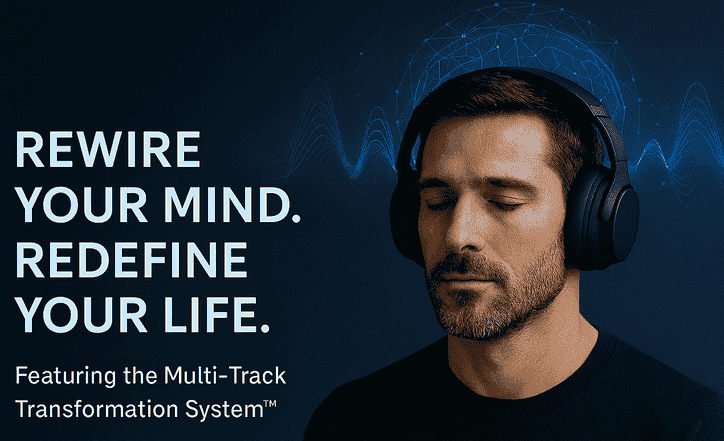Your Subconscious Mind Is Running the Show
Right now, your subconscious mind is determining the direction and quality of your life.
Your income. Your confidence. Your health. Your creativity. Your sporting performances. Your relationships.
Everything flows from internal programming.
If you want to change results on the outside, transformation must begin on the inside. Success is never accidental. It is neurological alignment between conscious desire and subconscious belief.
And the empowering truth is this: You can deliberately rewire your subconscious mind.
Your Subconscious Mind Is the Control Center
Your subconscious mind operates twenty four hours a day.
It regulates your heartbeat, breathing, digestion and immune system. It governs emotional reactions, habits, self image, creativity and resilience under pressure.
It is the most powerful biological computer in existence.
Like any computer, it runs on programs. Those programs were installed early in life through repetition, emotion and experience.
Some programs empower you. Some quietly limit you. Your results are simply reflections of those internal instructions.
If you experience anxiety before performing, that is programming. If you sabotage success just before breakthrough, that is programming. If you thrive under pressure and consistently elevate your standards, that is also programming.
The good news is that programs can be updated.
Transformation Begins Internally
Every meaningful transformation begins within.
Before income increases, belief expands. Before confidence is visible, identity shifts. Before physical performance improves, neurological patterns reorganize.
Inner change precedes outer results.
Many people attempt surface level change. They try motivation. They try temporary discipline. They try willpower.
But willpower battles programming. And programming always wins.
Real change occurs when you work directly with the subconscious system that governs behavior automatically.
⏳ Want an Easy Way to Enter the Right State?
A guided relaxation recording gently leads your mind and body into the precise neurological state where meditation feels natural, calm and effortless.
Download my complimentary 12 Minute Relaxation and use it whenever stress begins to rise.
✔ For deeper transformation, explore my Deep Meditation Program . It uses advanced audio technology to help you access levels of relaxation and clarity that traditionally required decades of disciplined meditation practice. You will also find a range of focused hypnosis audios available throughout this site.
Rewiring Through Relaxed Focus
The subconscious mind becomes most receptive in relaxed states such as alpha and theta brainwave frequencies.
These states reduce critical resistance and open access to deeper neurological layers where identity and belief patterns reside.
In these states, suggestion is not forced. It is absorbed.
Visualization strengthens neural pathways. > Affirmations reshape belief structures. Repetition stabilizes new identity patterns.
This is not mystical. It is neurological conditioning.
The brain reorganizes itself based on repeated mental experience. When you vividly rehearse success internally, the nervous system begins treating it as familiar rather than foreign.
And familiarity reduces fear.

What You Can Reprogram
Your subconscious influences every domain of life:
- Self confidence and identity
- Emotional resilience
- Financial expectations
- Health and stress response
- Professional performance
- Relationship patterns
If your subconscious believes success is unsafe, you will resist it. If it believes you are capable, deserving and prepared, progress accelerates naturally.
The subconscious does not argue. It executes.
The Sleeping Giant Within You
You possess immense untapped capacity. Humans use only a fraction of their mental potential because most operate on unconscious autopilot.
When you consciously retrain the subconscious system, you activate what feels like a sleeping giant. Results that once seemed distant begin appearing more quickly. Confidence stabilizes. Focus sharpens. Opportunities expand.
Not because luck changed. Because identity changed.

Consistency Creates Permanent Change
Rewiring is not a single event. It is a process of repetition.
Just as physical training builds muscle through consistent sessions, mental training builds new neural pathways through daily reinforcement.
Think of it as going to the inner gym.
Each session strengthens focus, belief and emotional regulation. Over time the new identity becomes automatic.
🎯 Need Something More Personalized?
While pre made programs are highly effective, sometimes you require something precisely tailored to your unique circumstances. Our custom hypnosis recordings are designed specifically for you, addressing your goals, challenges and performance demands.
Your potential is unlimited.
You possess the most advanced processing system on the planet, your subconscious mind, operating continuously and faithfully executing its instructions.
It influences your health, relationships, professional success and athletic performance.
It is waiting for updated instructions.
And the world benefits when you succeed. Your growth elevates others. Your confidence inspires. Your contribution creates impact.
Rewire your subconscious deliberately. Align your inner programming with your highest vision. And allow your results to reflect the transformation taking place within.
Success is not outside you. It is already coded within you.
Now it is simply time to activate it.







